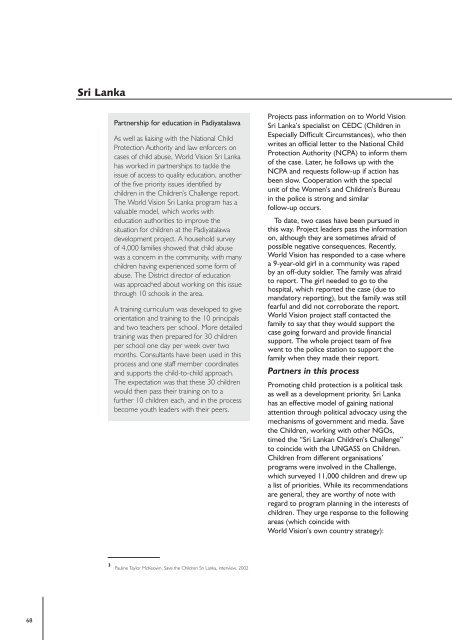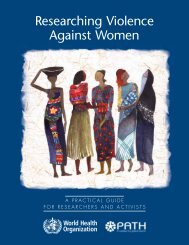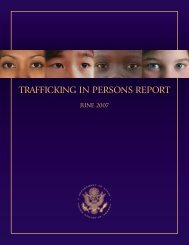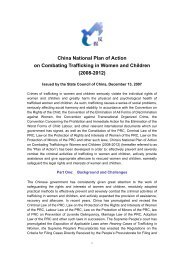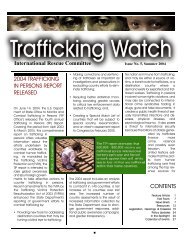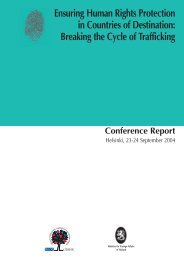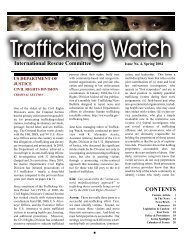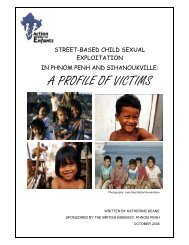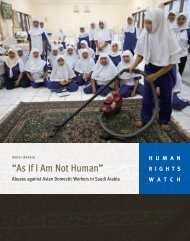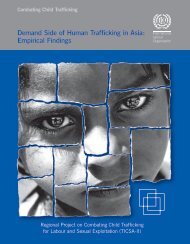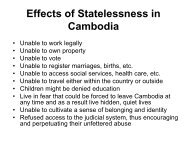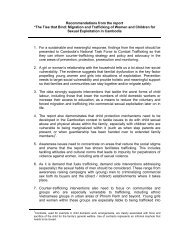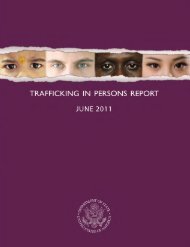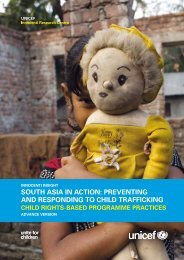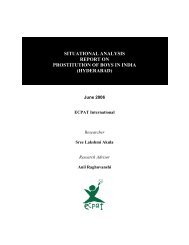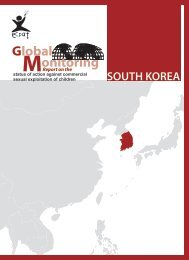Download PDF - Violence Against Children - East Asia and the ...
Download PDF - Violence Against Children - East Asia and the ...
Download PDF - Violence Against Children - East Asia and the ...
You also want an ePaper? Increase the reach of your titles
YUMPU automatically turns print PDFs into web optimized ePapers that Google loves.
Sri Lanka<br />
Partnership for education in Padiyatalawa<br />
As well as liaising with <strong>the</strong> National Child<br />
Protection Authority <strong>and</strong> law enforcers on<br />
cases of child abuse, World Vision Sri Lanka<br />
has worked in partnerships to tackle <strong>the</strong><br />
issue of access to quality education, ano<strong>the</strong>r<br />
of <strong>the</strong> five priority issues identified by<br />
children in <strong>the</strong> <strong>Children</strong>’s Challenge report.<br />
The World Vision Sri Lanka program has a<br />
valuable model, which works with<br />
education authorities to improve <strong>the</strong><br />
situation for children at <strong>the</strong> Padiyatalawa<br />
development project. A household survey<br />
of 4,000 families showed that child abuse<br />
was a concern in <strong>the</strong> community, with many<br />
children having experienced some form of<br />
abuse. The District director of education<br />
was approached about working on this issue<br />
through 10 schools in <strong>the</strong> area.<br />
A training curriculum was developed to give<br />
orientation <strong>and</strong> training to <strong>the</strong> 10 principals<br />
<strong>and</strong> two teachers per school. More detailed<br />
training was <strong>the</strong>n prepared for 30 children<br />
per school one day per week over two<br />
months. Consultants have been used in this<br />
process <strong>and</strong> one staff member coordinates<br />
<strong>and</strong> supports <strong>the</strong> child-to-child approach.<br />
The expectation was that <strong>the</strong>se 30 children<br />
would <strong>the</strong>n pass <strong>the</strong>ir training on to a<br />
fur<strong>the</strong>r 10 children each, <strong>and</strong> in <strong>the</strong> process<br />
become youth leaders with <strong>the</strong>ir peers.<br />
Projects pass information on to World Vision<br />
Sri Lanka’s specialist on CEDC (<strong>Children</strong> in<br />
Especially Difficult Circumstances), who <strong>the</strong>n<br />
writes an official letter to <strong>the</strong> National Child<br />
Protection Authority (NCPA) to inform <strong>the</strong>m<br />
of <strong>the</strong> case. Later, he follows up with <strong>the</strong><br />
NCPA <strong>and</strong> requests follow-up if action has<br />
been slow. Cooperation with <strong>the</strong> special<br />
unit of <strong>the</strong> Women’s <strong>and</strong> <strong>Children</strong>’s Bureau<br />
in <strong>the</strong> police is strong <strong>and</strong> similar<br />
follow-up occurs.<br />
To date, two cases have been pursued in<br />
this way. Project leaders pass <strong>the</strong> information<br />
on, although <strong>the</strong>y are sometimes afraid of<br />
possible negative consequences. Recently,<br />
World Vision has responded to a case where<br />
a 9-year-old girl in a community was raped<br />
by an off-duty soldier. The family was afraid<br />
to report. The girl needed to go to <strong>the</strong><br />
hospital, which reported <strong>the</strong> case (due to<br />
m<strong>and</strong>atory reporting), but <strong>the</strong> family was still<br />
fearful <strong>and</strong> did not corroborate <strong>the</strong> report.<br />
World Vision project staff contacted <strong>the</strong><br />
family to say that <strong>the</strong>y would support <strong>the</strong><br />
case going forward <strong>and</strong> provide financial<br />
support. The whole project team of five<br />
went to <strong>the</strong> police station to support <strong>the</strong><br />
family when <strong>the</strong>y made <strong>the</strong>ir report.<br />
Partners in this process<br />
Promoting child protection is a political task<br />
as well as a development priority. Sri Lanka<br />
has an effective model of gaining national<br />
attention through political advocacy using <strong>the</strong><br />
mechanisms of government <strong>and</strong> media. Save<br />
<strong>the</strong> <strong>Children</strong>, working with o<strong>the</strong>r NGOs,<br />
timed <strong>the</strong> “Sri Lankan <strong>Children</strong>’s Challenge”<br />
to coincide with <strong>the</strong> UNGASS on <strong>Children</strong>.<br />
<strong>Children</strong> from different organisations’<br />
programs were involved in <strong>the</strong> Challenge,<br />
which surveyed 11,000 children <strong>and</strong> drew up<br />
a list of priorities. While its recommendations<br />
are general, <strong>the</strong>y are worthy of note with<br />
regard to program planning in <strong>the</strong> interests of<br />
children. They urge response to <strong>the</strong> following<br />
areas (which coincide with<br />
World Vision’s own country strategy):<br />
3<br />
Pauline Taylor McKeown, Save <strong>the</strong> <strong>Children</strong> Sri Lanka, interview, 2002<br />
68


